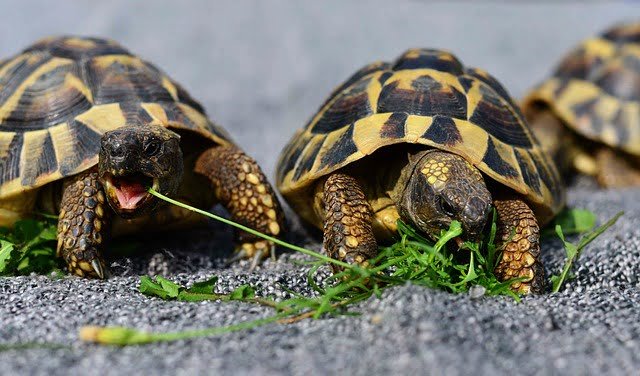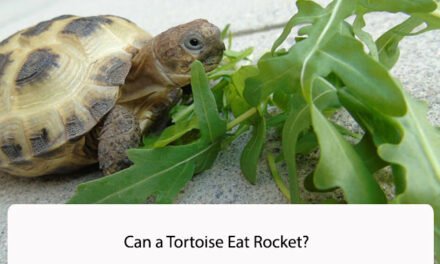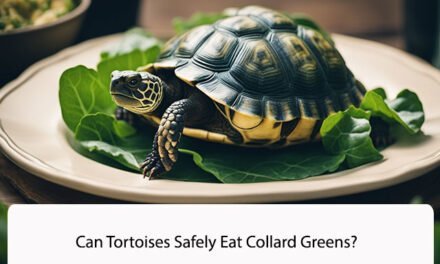Russian tortoises are popular pets that are known for their hardiness and adaptability. They are herbivores and require a varied diet to maintain their health. One common question that owners have is whether or not their Russian tortoise can eat spinach.
Spinach is a leafy green vegetable that is high in nutrients such as iron, calcium, and vitamin C. While spinach can be a healthy addition to a human diet, it may not be suitable for all animals. In the case of Russian tortoises, spinach should be fed in moderation due to its high oxalate content. Oxalates can bind to calcium, making it difficult for tortoises to absorb this essential nutrient.

Understanding Russian Tortoise Diet
Natural Habitat Diet
In the wild, Russian tortoises mainly feed on grasses, weeds, and flowers. Their diet consists of a variety of plants, including dandelion, clover, plantain, chickweed, and hibiscus. They also eat some fruits and vegetables, such as berries and leafy greens, but these are not a major part of their diet.
Diet in Captivity
When keeping a Russian tortoise in captivity, it is important to replicate their natural diet as closely as possible. This means feeding them a variety of grasses, weeds, and flowers, as well as some fruits and vegetables. However, it’s important to note that not all fruits and vegetables are safe for Russian tortoises to eat.
One common question is whether Russian tortoises can eat spinach. While spinach is a leafy green and is generally considered healthy for humans, it is not recommended as a regular part of a Russian tortoise’s diet. Spinach contains high levels of oxalates, which can bind to calcium and prevent it from being absorbed by the tortoise’s body. Over time, this can lead to calcium deficiency, which can cause health problems.
Instead of spinach, it is recommended to feed Russian tortoises a variety of other leafy greens, such as kale, collard greens, and mustard greens. These greens are lower in oxalates and provide a good source of calcium and other nutrients.
In addition to leafy greens, it is also important to provide Russian tortoises with a variety of other plants, such as dandelion, clover, and plantain. These plants are high in fiber and provide important nutrients for the tortoise’s digestive system.
Overall, it is important to provide a varied and balanced diet for Russian tortoises in captivity, replicating their natural diet as closely as possible. By doing so, we can help ensure their health and well-being.
Can Russian Tortoise Eat Spinach
Nutritional Value of Spinach
Spinach is a leafy green vegetable that is packed with essential nutrients, making it a popular choice for human consumption. However, it is important to consider the nutritional value of spinach for our pet Russian tortoises.
Spinach is a good source of vitamins A, C, and K, as well as iron, calcium, and fiber. These nutrients can be beneficial for the overall health of our tortoises, but it is important to note that spinach should not be the sole source of these nutrients.
Possible Risks
While spinach can be a nutritious addition to our tortoise’s diet, it is important to be aware of the potential risks associated with feeding spinach to our pets.
Spinach contains high levels of oxalates, which can bind to calcium and prevent its absorption. This can lead to the development of kidney stones, which can be a serious health concern for our tortoises.
In addition, spinach contains a compound called beta-carotene, which can be harmful in large quantities. Excessive amounts of beta-carotene can lead to a condition called carotenemia, which causes the skin to turn yellow or orange.
Overall, while spinach can be a nutritious addition to our tortoise’s diet, it should be fed in moderation and should not be the sole source of nutrients. It is important to consult with a veterinarian or a reptile nutritionist to ensure that our tortoise’s diet is balanced and meets their specific nutritional needs.
Alternatives to Spinach for Russian Tortoise
Recommended Greens
While spinach is a nutritious leafy green that many Russian tortoises enjoy, it should not be the only green in their diet. Here are some other greens that we recommend:
- Arugula
- Collard greens
- Dandelion greens
- Endive
- Escarole
- Kale
- Mustard greens
- Turnip greens
These greens are also high in calcium and low in phosphorus, which is important for maintaining healthy bones and preventing metabolic bone disease. It is important to offer a variety of greens to ensure that your Russian tortoise is getting a balanced diet.
Fruits and Vegetables
In addition to greens, Russian tortoises can also eat a variety of fruits and vegetables. Here are some options:
- Bell peppers
- Carrots
- Cucumbers
- Squash
- Sweet potato
- Zucchini
It is important to note that fruits should be given in moderation due to their high sugar content. Vegetables should be chopped into small pieces to make it easier for your tortoise to eat. As always, make sure to research any new food before giving it to your tortoise to ensure that it is safe for them to eat.
In conclusion, while spinach can be a part of a Russian tortoise’s diet, it should not be the only green offered. A variety of greens, fruits, and vegetables should be offered to ensure a balanced diet.

How to Feed Spinach to Your Russian Tortoise
Feeding spinach to your Russian tortoise can be a healthy addition to their diet. However, it is important to remember that spinach should only be given in moderation. Spinach contains high levels of oxalates, which can bind to calcium and cause health issues if consumed in large amounts.
When feeding spinach to your Russian tortoise, it is recommended to follow these guidelines:
- Only feed spinach as a treat, not as a regular part of their diet.
- Offer spinach in small amounts, about once or twice a week.
- Alternate spinach with other leafy greens such as kale, collard greens, or dandelion greens.
- Make sure to wash spinach thoroughly before feeding it to your tortoise to remove any pesticides or dirt.
- Chop the spinach into small pieces to make it easier for your tortoise to eat.
It is also important to note that not all Russian tortoises may enjoy or tolerate spinach. Some may have digestive issues or refuse to eat it altogether. As with any new food, it is recommended to introduce spinach slowly and monitor your tortoise’s reaction.
In conclusion, feeding spinach to your Russian tortoise can be a healthy addition to their diet when done in moderation. By following these guidelines, you can ensure that your tortoise receives the proper nutrition without any negative health effects.
Conclusion
In conclusion, while spinach is a nutritious vegetable, it should not be the primary food source for Russian tortoises. We have found that spinach contains high levels of oxalates, which can bind to calcium and prevent its absorption, leading to metabolic bone disease.
However, spinach can be offered as an occasional treat in small amounts, along with a varied diet of other leafy greens, vegetables, and fruits. We recommend feeding Russian tortoises a diet that is high in fiber and calcium, and low in protein and fat.
It is important to note that every tortoise is different, and their dietary needs may vary based on their age, size, and overall health. We encourage tortoise owners to consult with a veterinarian who specializes in reptiles to create a personalized diet plan for their pet.
Overall, while spinach can be a healthy addition to a Russian tortoise’s diet, it should not be relied upon as a staple food source. By providing a balanced diet and seeking expert advice, we can ensure that our beloved pets remain healthy and happy for years to come.

Frequently Asked Questions
What do Russian tortoises need in their cage?
Russian tortoises require a dry and warm environment with a basking area and a hiding spot. The cage should be large enough for the tortoise to move around and have a varied terrain. A substrate of sand, coconut coir, or a mixture of both is recommended. A shallow dish of water should be available at all times, and the temperature should be maintained between 80-90°F.
What vegetables can Russian tortoises not eat?
Russian tortoises should not be fed vegetables that are high in oxalates, such as spinach, beet greens, and Swiss chard. These vegetables can bind to calcium and prevent its absorption, leading to metabolic bone disease. Vegetables high in goitrogens, such as kale, broccoli, and cabbage, should also be avoided as they can interfere with thyroid function.
Can tortoise eat lettuce?
Lettuce is not recommended as a staple food for Russian tortoises, as it is low in nutrition and high in water content. However, it can be fed occasionally as a treat.
Can tortoise eat spring mix?
Spring mix is a combination of various lettuce varieties and other greens. While it is not harmful to feed spring mix to Russian tortoises, it should not be the sole source of greens in their diet. Variety is important, and a mix of different greens should be offered.
Can tortoises eat cabbage?
Cabbage is high in goitrogens and should be avoided as a regular part of a Russian tortoise’s diet. However, it can be fed occasionally as a treat.
What not to feed a Russian tortoise?
Russian tortoises should not be fed fruits, as they are high in sugar and can lead to digestive issues. They should also not be fed processed foods, dairy products, or meat. In addition, any plants or vegetables that have been treated with pesticides or herbicides should be avoided.




